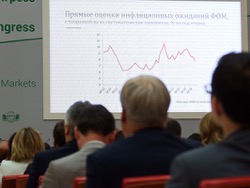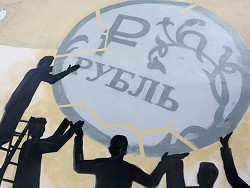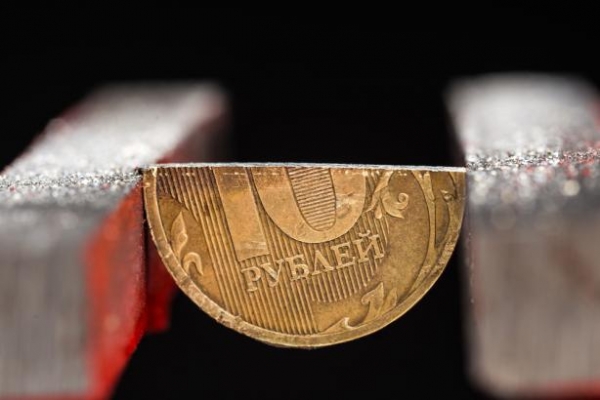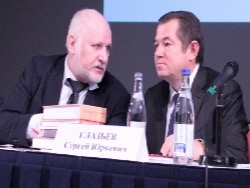
The Bank of Russia spoke about the terrible prospects for the global economy
Nothing good in the world happens, you need to get used to living in a perpetual storm. This is a brief summary of the first day of the International financial Congress, held in St. Petersburg. The Congress talked a lot about “black swans”, and one of the guests was “the king’s economic horror” — chief economist HSBC Stephen king. The Correspondent.<url>” watched, how the government, bankers and experts scare each other.
Swan lake
The world is rapidly changing and transformation is highly in demand. This is the first idea expressed by the President of the Bank of Russia Elvira Nabiullina at the International financial Congress. In General, because of the thrust to transform the event and change the sign: before it was called just the Bank of Congress.
Official mascot (mascot) updated the forum could well become the black Swan. A rare bird that flew into the economic dictionaries the efforts of the American trader Nassim Taleb, mentioned by virtually every speaker. The theory of “black Swan” explores the unpredictable and often catastrophic events that have a significant impact on the financial and economic system. In recent times, such events happen more often.
“Black swans” in financial markets is not uncommon,” stated Elvira. In recent years, there are three of them. First, the Federal system (FRS) announced the tapering of quantitative easing and have stopped injecting money into the us economy through the purchase of assets. Then collapsed oil prices. Then I had to consider the risks, manifested in the Chinese economy.

Brexit will not have a direct influence on Russia. But he still became the main “black Swan” 2016
Photo: Mary Turner / Getty Images
“One “black Swan” has already left is Brexit” — said the head of the Central Bank. She added that the direct impact of a British exit from the EU on the Russian financial system will be limited. Domestic markets are relatively easily tolerated, increased volatility, she said and went back to the theme of change.
Nabiullina said that a Brexit — a vivid example of what people aspire for changes, mostly economic. Low growth, lack of breakthrough technologies, the ageing of the population — here are a few reasons for disappointment, evidence of which were the results of a British referendum.
Ghost Glazyev
In the face of uncertainty, the growth of risk and the emergence of global threats is very easy to fall into populism and naprinimali a lot of bad decisions. In Russia, like easy recipes, but they are extremely dangerous, I’m sure the head of the Central Bank: “for Example, promises that by printing a one-two-three trillion rubles and issuing them in the form of cheap loans, we get a steady acceleration in the rate of economic growth.” The second seductive — frost of the ruble. “Under it is even supplied pseudo-base,” said Elvira Nabiullina.
No names or posts it is not named, but clearly meant for someone specific — someone who is in favour of exchange controls or pumping the economy with cheap money. Both regularly offers, for example, the presidential Advisor academician Sergei Glazyev.
He, we recall, accused the Bank of Russia in the madness. Glazyev also said that the regulator’s policy led to economic disaster.

Alarming predictions have occupied an important place in the International financial Congress. One of them promises many years of the lack of any certainty in the markets
Photo: ibcongress.ru
“Tekrony crisis” and the “king of terrors”
The President of the Mexican investment company BTG Pactual Guillermo Ortiz came to St. Petersburg to talk about the work of the regulator in his country. It turned out, Russia and Mexico are very similar to each other.
Latin American countries have experienced a long series of economic problems, with exacerbations lasting from 1985. It culminated in “tekrony crisis” of 1994. In it everything is mixed up: the Zapatista uprising (left-wing radicals who wanted to foment revolution throughout the country, but it turned out only in Chiapas), a sharp fall of investment attractiveness, the collapse of the local stock exchanges and depletion of reserves. 1 Nov Mexico was $ 29 billion, by the end of December was less than four.
The Mexican Central Bank followed the path chosen today by the Bank of Russia. Was set the target of inflation to three percent (a goal, incidentally, is implemented). Peso was allowed to float freely. Conducted tight monetary policy. “Inflation is something that always confuses people. When inflation drops to 2-3 per cent, people are no longer to worry about it” — so Ortiz justified the choice of figure is three percent. However, he did not mention one detail — the Mexico was actively helped by the whole world. She received more than $ 50 billion from the US, ECB, Japan, and the IMF.
The namesake of the American “king of horror” — the chief economist of the British Finance Corporation HSBC Stephen king started doing what he does best: scare and warn. “I have a very long list of things for which I’m worried”, he replied to the request Nabiullina to talk about global economic risks. And began to list.
First, the United States economy may not recover for seven years. There is a very real risk that it will slide into recession. “Lifeboats” is already there, evidenced by the fed’s policy in the past at the slightest improvement of the situation the fed raised rate, now it has frozen at extremely low levels (of 0.25-0.50 percent).
Second, Brexit. The full force of its effects will be felt by the British (the weakening of the pound, rising prices, falling real incomes), but the referendum has become a challenge for the whole of Europe.
Thirdly, the world is now actively going currency war. “If one country devalues the currency, and the rest — no, that’s good,” said Stephen king. The problem arises when many countries at once weaken the national currency. So, economic problems in China caused by the devaluation in other States, said the king. Many countries due to the currency depreciation “exported” their own problems in China. As a result, the growth rate of China’s GDP are falling, and everyone suffers.

Elvira Nabiullina supported the introduction of fiscal rules and a reduction of Russia’s dependence on oil
Photo: Evgeniy Pereverzev / “Kommersant”
Oil and Chinese — our problem
One way or another, but Russia remains dependent on external conditions. Assessment of the Central Bank, the fall, the PRC’s GDP by one percentage point would reduce the Russian economy by half a percentage point.
Another sore point — the price of oil. A quick return to the high quotations of not happen, says Nabiullina. “The Russian economy must learn to live in conditions of low oil and gas prices. And we should abandon the habit to associate a optimistic with the growing price of oil,” she said.
Thus Nabiullina called for the introduction of fiscal rules. $ 50 per barrel — that’s a possible price cut. Oil and gas revenues above this level should be reserved. According to the Central Bank, a fiscal rule would help reduce Russia’s dependence on commodity prices.
In this question the head of the Bank of Russia entered into a polemic with Minister of economic development Alexei Ulyukaev. At the St. Petersburg international economic forum, which was held in mid-June, the official criticized the very concept of the fiscal rule linking it with the low quality of public administration. “We need a fiscal rule, we need the right budget,” he stressed. The speaker urged not to focus on the quotes and forget about the oil (all the precepts of the Nobel laureate Christopher Pissarides). “The chances that the price [of oil] will be correct, exactly the same as went out into the street, to meet the green monkey is 50 percent. Either meet or not meet, in the same way and with the price of oil,” — sneered the speaker.
But Ulyukayev and Elvira definitely agree. Now Russia has sharply escalated the need for structural reforms. Without them, the Central Bank will fail to help the economy — the tools of the regulator is extremely limited. Only systemic change will help to overcome the ceiling of potential growth that has emerged over the country. It is limited to 1.5-2 percent per year. The main thing you need to do to improve the business climate (especially the protection of property rights), said the Chairman of the Bank of Russia. Well, the regulator will try to bring down inflation to four percent by the end of 2017, which should ensure macroeconomic stability.
But business not only in stability. As a bonus, Elvira Nabiullina monument. At least, this actively encourages the head of “RUSNANO” Anatoly Chubais: “If the Central Bank next year will reduce inflation even up to four percent, and five, then for it is certainly possible to put a monument to Ms. Nabiullina. Without irony, I say seriously.”
However, the leadership of the Central Bank promised a lot of things. Launch them into space, for example. All for the sake of the panoramic view on the Russian economy after a sharp increase in the key rate to 17 percent (proposed by billionaire Oleg Deripaska).
But until and space, and the monument — the case of the distant and uncertain prospects. And inflation is really slowing down.








